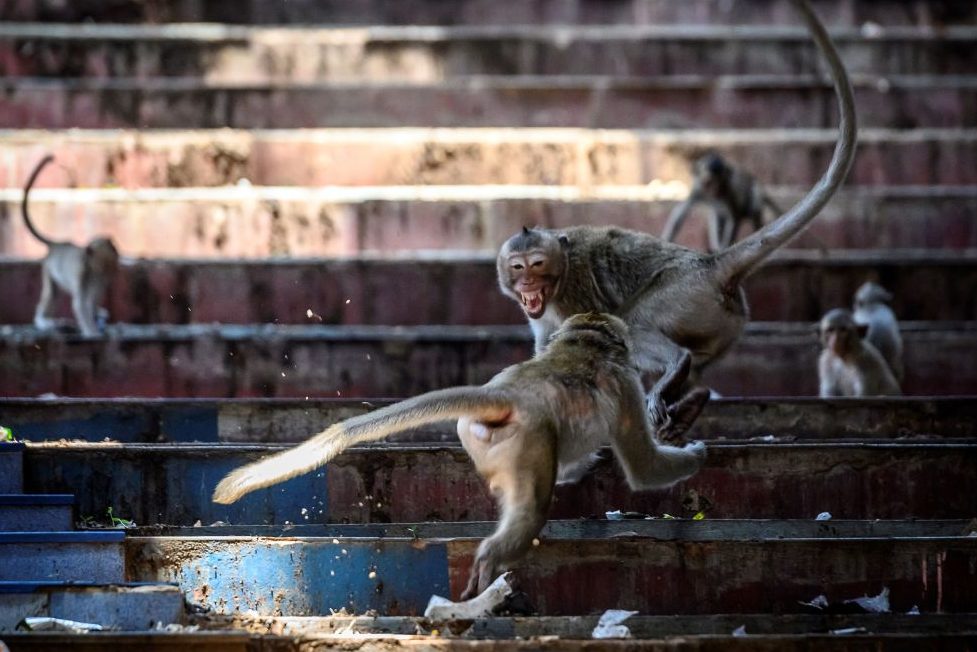It’s been three months since Lopburi, Thailand, closed itself off to tourists due to the novel coronavirus — and three months since the city’s wild macaques last had a good banana.

The so-called “Monkey City” has gone bananas ever since, with locals forced into a double lockdown against the invisible threat of COVID-19, and against the loud, stinky, aggressive and highly visible threat of thousands of rampaging monkeys.
Lopburi locals have barricaded themselves inside against the macaques, and the city has designated several no-go zones that have been entirely taken over by warring factions of monkeys.
“We live in a cage but the monkeys live outside,” Lopburi resident Kuljira Taechawattanawanna told the AFP. She says she was forced to cover her terrace with netting to keep the hungry animals from raiding her home for food.
“Their excrement is everywhere (and) the smell is unbearable, especially when it rains,” she added.
Humans in the city had found a delicate balance with the thousands of macaques who lived there in pre-coronavirus times. The macaques attracted tourists to the city, and those tourists would buy bananas so they could feed the animals and take photos with them.
However, that delicate balance collapsed under the threat of the coronavirus, when lockdowns cut off the supply of tourists and left the hungry monkeys looking for a new food source. The world caught a glimpse of that struggle last March when video of a fight between rival monkey gangs went viral.
Things have only gotten worse since then, locals say. They’ve tried to keep the animals at bay by throwing them scraps and junk food, but that only made the monkeys more violent, officials say.

Get breaking National news
“The more they eat, the more energy they have … so they breed more,” Pramot Ketampai, a manager of several shrines in the city, told AFP.
“They’re so used to having tourists feed them and the city provides no space for them to fend for themselves,” Supakarn Kaewchot, a government veterinarian, told Reuters.
“With the tourists gone, they’ve been more aggressive, fighting humans for food to survive,” she added. “They’re invading buildings and forcing locals to flee their homes.”
The city monkeys have more energy for things like fighting and sex because they don’t have to hunt for food, Supakarn says. That’s why officials are now taking steps to get their numbers under control.
Thailand’s Department of National Parks has launched a program to sterilize some 500 monkeys, in hopes of curbing the population in the city. The monkeys are being captured, sedated, castrated and released with reference numbers tattooed on their bodies.
The initiative is meant to slow their reproduction rate, and is not aimed at hurting the existing population, Supakarn said.
“We’re not doing this in the wild, only in the city areas,” she said.
The city’s wildlife department hopes to find a more long-term solution for the problem by building a new monkey sanctuary. However, that might not be an easy sell for locals who would rather see the monkeys disappear altogether.
“We need to do a survey of the people living in the area first,” wildlife official Narongporn Dauduem told the AFP. “It’s like dumping garbage in front of their houses and asking them if they’re happy or not.”
Shop owner Taweesak Srisaguan told the AFP that monkeys living in a nearby cinema routinely stop by to steal spray cans from his store, but he admits he’d miss their monkey business if they were permanently relocated.
“I’m used to seeing them walking around, playing on the street,” he said. “If they’re all gone, I’d definitely be lonely.”
In other words, he likes that Lopburi is known as the Monkey City — he just doesn’t want it to become known as the Monkeys’ City.
—
Questions about COVID-19? Here are some things you need to know:
Symptoms can include fever, cough and difficulty breathing — very similar to a cold or flu. Some people can develop a more severe illness. People most at risk of this include older adults and people with severe chronic medical conditions like heart, lung or kidney disease. If you develop symptoms, contact public health authorities.
To prevent the virus from spreading, experts recommend frequent handwashing and coughing into your sleeve. They also recommend minimizing contact with others, staying home as much as possible and maintaining a distance of two metres from other people if you go out. In situations where you can’t keep a safe distance from others, public health officials recommend the use of a non-medical face mask or covering to prevent spreading the respiratory droplets that can carry the virus.
For full COVID-19 coverage from Global News, click here.
—With files from Reuters













Comments
Want to discuss? Please read our Commenting Policy first.